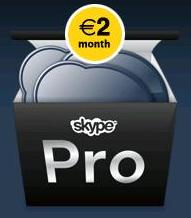A few weeks back at ITEXPO there was a lot of buzz about Skype Pro and as it turns out the service goes live on Tuesday, February 19. I had a chance to speak with Skype’s Imogen Bailey and Stefan Oberg’s the VP and General Manager of Skype Telecoms about the announcement and much more.
 What is Skype Pro?
What is Skype Pro?Skype Pro is basically a bundled package of services at a fixed price. The reason for this offering is to eliminate the one by one marketing of services customers would have to buy to receive similar functionality. In much the same way a cell phone provider gives voicemail, some SMS messages and a certain number of calling minutes, so too has Skype decided to make it easier for customers to buy a package of services.
Skype Pro’s subscription package costs €2 per month and includes:
- Zero cents per minute calling to domestic (European) landlines in (country) previously €0.017* per minute
- Free Skype Voicemail (normally €15 per year)
- €30 discount on SkypeIn numbers
- €5 Skype Credit included as part of the introductory offer
- A €30 discount on a Philips VoIP 841 cordless phone.
- A €10 discount on an SMC WiFi phone.
- Additional discounts on a series of Skype Extras are also available including desktop sharing, avatars, emoticons and ring tones
The service will initially be available across Europe in the following countries:
Austria, Belgium, Denmark, Estonia, Finland, France, Germany, Ireland, Italy, Netherlands, Norway, Portugal, Spain, Sweden and the UK
It is worth noting at this point that all SkypeOut calls, including calls made by Skype Pro subscribers, are subject to a connection fee.
The package seems quite reasonable and Skype has really done a good job bundling some sought after features into an easy to digest offering. I asked if this sort of plan would morph onto one world plan in the future and was told that this is not the current objective. Instead, a similar France plan and UK plan will migrate to Skype Pro. Eventually the US plan will be harmonized into Skype Pro as well. So basically we will see regional variations of Skype Pro.
I asked Stefan about the mysterious disappearance of the number of downloads on the Skype website and he told me the number was a bit misleading as the same person could have been downloading various versions of the software. Instead the company says it has 171 million users at the end of last year and this compares favorably with the 44 million they had at the time of the eBay acquisition about 15 months prior.
In response to a question about competitive threats Stefan mentioned the usual suspects such as Yahoo!, Google, DSL and cable providers. He feels that the Skype Pro package has the best value in the competitive space and isn’t afraid to mention that Skype’s price is a fraction of Vonage’s. Of course Vonage is a PSTN replacement and Skype is not but nonetheless there is obviously a great deal of value being provided by this new Skype package.
I also had a chance to discuss the incidents of Skype being blocked around the world. The responds to this question was that countries that come in such conversations don’t have a financial significance in the market. I of course brought up China as a while back there was news of Skype being blocked there. The response was that Skype works closely with Tom Online who manages the face of Skype in China. This allows Chinese citizens to benefit and the local regulations to be respected I was told.
I was also told that Skype was banned in San Jose University which I found to be ironic as it is located in the heart of Silicon Valley. Apparently there was a mini student revolt as a result of this action and Skype had a talk with the university as well. The university changed course fairly quickly. Surprisingly Oxford also banned and unbanned Skype at one point.
This of course leads naturally to the point of how Skype interacts with enterprise IT managers and systems. The company was proactive in telling me that the latest version of Skype allows IT departments to control which features the clients have as well as how the software package runs on the network. The Internet telephony software can even be installed on all computers remotely.
I asked about security issues as this has been a topic of interest in the news media. The response was that Skype can be configured to block file transfers which is one source of security problems for MIS directors. In addition I was told that Skype data has never been compromised and the conversations utilize 256 bit encryption which makes it more secure than PSTN calls where anyone with a phone set can tap into the line and listen in. In addition the software does not open holes in firewalls according to Oberg.
This naturally lead to me asking about Sarbanes Oxley and whether the software will support the recording and archiving features needed by such regulations. In response I was told the company does not have a solution at this time but is working with partners such as FaceTime to address such issues.
Other features worth noting are the Skype for Business Control Panel allowing corporations to centrally manage Skype credits. Prior to this system individuals had to expense their calls and pay for them on their own.
I then asked about multiparty videoconferencing which is sometimes referred to as Brady Bunch calling. The point is being able to display multiple video windows simultaneously. The response was that only tech savvy users have asked for this feature and the typical application where grandma wants to see the kids does not lend itself to such functionality. Besides I was told a third party application did exist to allow this capability but it just didn’t take off.
As I mentioned in past articles, Skype seems serious about generating revenue and at the same time is offering calling packages that are extremely reasonable. The question worth asking is whether the company will be able to make its revenue targets at current pricing levels or will they need to raise prices.
In addition, will the new bundling initiatives entice more Skype users to get out their credit cards? Finally, will such packaging help Skype lure away customers from the various competitors in the market? It will be worth watching the company to see how it continues to bundle around the world and further to see how the competition reacts to Skype’s new offerings. In the end bundled packages which add value are good for Skype, consumers and the IP communications market as a whole.





